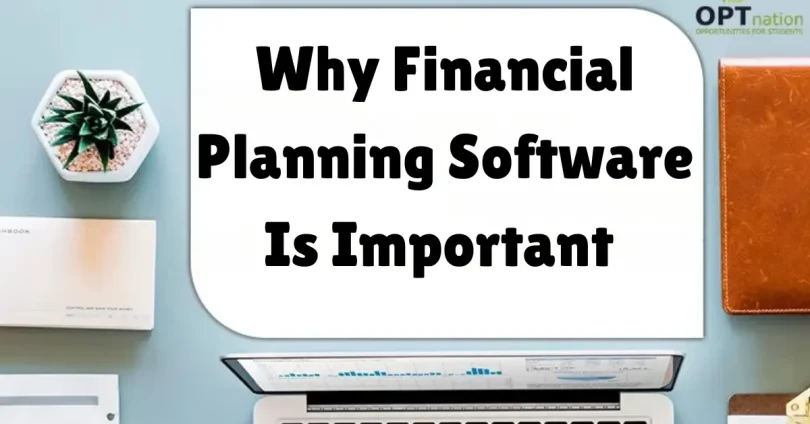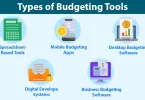Managing money effectively is one of the most important skills for running a successful business or maintaining personal financial health. Without knowing exactly where your money is going, it’s easy to overspend, miss opportunities, or face unexpected financial challenges. For example, a small business owner who tracks expenses manually might discover too late that overspending on supplies has left no room for marketing or growth investments.
This is why why financial planning software is important. It’s more than just a digital ledger—it’s a powerful tool that helps businesses and individuals monitor spending, forecast future cash flow, and make informed, strategic decisions. Whether you’re running a growing business or managing your personal budget, financial planning software gives you clarity, saves time, and sets you on the path to long-term financial stability.
1. Accurate Financial Forecasting

One of the biggest advantages of using financial planning software is its ability to provide accurate financial forecasting. These tools analyze real-time data from multiple sources to predict future cash flows, profits, and potential losses. Unlike traditional methods, which often rely on guesswork or outdated spreadsheets, modern financial software uses historical trends and predictive analytics to generate reliable forecasts.
For businesses, this means you can plan budgets for the next quarter or year with confidence, allocate resources efficiently, and avoid costly surprises. For individuals, financial forecasting helps plan major expenses like home purchases, vacations, or retirement savings. Essentially, it turns complex numbers into clear, actionable insights, allowing you to make smart financial decisions.
2. Efficient Budget Management
Budgeting is a fundamental part of financial success, but it’s often easier said than done. As businesses grow or as personal financial responsibilities increase, managing a budget manually becomes overwhelming. This is why financial planning software is important—it streamlines the budgeting process.
With automated tracking of income, expenses, and financial goals, the software gives you a clear view of your financial health at any given moment. You can set spending limits, receive alerts for overspending, and identify areas where you can save more. This level of control not only prevents unnecessary expenses but also ensures that your money is being used in the most effective way possible.
You may also like to read this:
Why Financial Discipline Matters For Wealth | 7 Key Benefits
12 Wealth Building Habits of Successful People 2025
What Are Money Management Tools? A Simple Guide
7 Types of Budgeting Tools For Smarter Money Management
Master How To Use Expense Tracker Apps Effectively Today
3. Time-Saving Automation
Let’s be honest—manual financial planning can be exhausting. From creating spreadsheets to performing endless calculations and updating data, it consumes a lot of valuable time. Financial planning software automates many of these tasks, saving hours every week.
The software can generate reports, track transactions, categorize expenses, and even reconcile accounts automatically. This automation reduces human errors and allows you to focus on more strategic activities, such as growing your business, planning investments, or achieving personal financial goals. In essence, the software does the heavy lifting for you, making financial management more efficient and less stressful.
4. Strategic Decision-Making
Financial planning isn’t just about tracking money—it’s about making informed, strategic decisions. Financial planning software provides insights that were previously difficult to obtain. Features like scenario analysis, trend tracking, and visual dashboards allow you to see how different financial choices might impact your future.
For businesses, this means you can evaluate investment opportunities, expansion plans, or cost-cutting strategies with confidence. For individuals, it helps in planning for big milestones like buying a home, funding education, or preparing for retirement. Essentially, the software acts as a 24/7 financial advisor, helping you make smarter decisions based on solid data rather than intuition alone.
5. Risk Management and Compliance

Managing financial risk is critical, especially for businesses. Financial planning software helps mitigate risks by maintaining accurate records of all transactions and providing tools to monitor financial performance. It also ensures compliance with tax laws and industry regulations, reducing the chances of errors, fines, or legal issues.
For instance, automatic alerts can notify you if a transaction doesn’t align with your financial policies, while detailed audit trails ensure transparency and accountability. By providing these safeguards, financial planning software gives both businesses and individuals peace of mind, knowing that their finances are well-protected.
6. Collaboration and Accessibility
Modern financial planning software often comes with cloud-based capabilities, making it easier than ever to collaborate. Team members, financial advisors, or accountants can access financial data in real-time, regardless of their location.
This accessibility ensures that decisions are made quickly and accurately, especially in dynamic business environments. For individuals, cloud-based software allows you to check your financial status on the go, whether you’re traveling, shopping, or managing multiple bank accounts. It’s a level of convenience and flexibility that traditional financial management methods simply cannot provide.
7. Personalized Financial Insights
Another reason financial planning software is important is its ability to provide personalized financial insights. Unlike generic budgeting tools, advanced software analyzes your unique financial patterns, identifies trends, and offers recommendations tailored to your goals. For example, it can highlight recurring unnecessary expenses, suggest areas for investment, or recommend adjustments to improve cash flow.
For businesses, personalized insights help optimize operations and reduce overhead costs. For individuals, they can guide smarter spending habits, boost savings, and even plan for tax optimization. These insights empower you to make proactive decisions rather than reactive ones.
8. Scenario Planning for the Future
Financial planning software often comes with scenario planning features. This allows you to create “what-if” simulations—such as changes in revenue, unexpected expenses, or economic downturns—and see how they would impact your finances.
For businesses, this is invaluable for strategic planning. You can test expansion strategies, new product launches, or staffing changes without risking financial instability. For individuals, scenario planning helps prepare for life changes, like buying a home, starting a family, or switching careers. It’s a way to anticipate challenges and make informed choices before they happen.
9. Integration with Other Financial Tools
Modern financial planning software can integrate seamlessly with other tools like accounting software, payroll systems, and investment platforms. This integration ensures that all your financial data is centralized, reducing manual entry errors and saving time.
For businesses, integration allows a real-time view of cash flow, employee payroll, and revenue streams, ensuring a comprehensive financial picture. For individuals, connecting bank accounts, credit cards, and investment portfolios enables a complete snapshot of your financial situation. This holistic approach is another reason why financial planning software is important—it ensures no detail is overlooked.
10. Enhanced Security and Data Protection
With the increasing threat of cybercrime, financial security is more important than ever. Financial planning software comes with robust security measures, such as data encryption, multi-factor authentication, and secure cloud storage.
This protects sensitive financial data from unauthorized access, fraud, or accidental loss. For businesses, this means client and company information remains confidential. For individuals, it ensures that personal financial records and investment data are safe. Security and reliability make this software an indispensable tool for modern financial management.
Practical Tips for Getting the Most Out of Financial Planning Software
- Choose the Right Software: Look for software that fits your needs—business size, personal finances, or specific features like forecasting, scenario planning, or integration capabilities.
- Keep Data Updated: Regularly update income, expenses, and investments to ensure accurate analysis and reporting.
- Leverage Automation: Use automated alerts, recurring expense tracking, and reporting features to save time and reduce errors.
- Review Reports Regularly: Analyze financial reports weekly or monthly to monitor progress toward goals and make adjustments when necessary.
- Collaborate with Experts: Share access with financial advisors or team members to benefit from collective insights and better decision-making.
Conclusion
Understanding why financial planning software is important is essential for anyone serious about achieving financial stability and long-term success. This software does more than just track numbers—it enables accurate forecasting, efficient budgeting, time-saving automation, strategic decision-making, risk management, and seamless collaboration.
Whether you’re managing a growing business or planning your personal finances, financial planning software is no longer optional—it’s a necessity. By adopting this technology, you gain control over your finances, make smarter decisions, and set yourself on a path toward sustainable financial growth.
FAQs
1. What is financial planning software?
Financial planning software is a digital tool designed to help businesses and individuals manage their finances efficiently. It tracks income, expenses, investments, and budgets while providing insights for better financial decision-making and long-term planning.
2. Why is financial planning software important for businesses?
It helps businesses forecast cash flow, manage budgets, reduce financial risks, and make strategic decisions. It also ensures compliance with regulations and improves collaboration among team members.
3. Can individuals benefit from financial planning software?
Yes! Individuals can track expenses, plan for future goals, manage investments, and get personalized financial insights. It helps reduce overspending, save more, and make informed decisions about money.
4. How does financial planning software save time?
The software automates tasks like expense tracking, report generation, account reconciliation, and data entry. This eliminates manual calculations and spreadsheets, freeing up time for strategic financial planning.
5. Does financial planning software help with risk management?
Absolutely. It tracks all transactions, maintains accurate records, and provides alerts for unusual activities. This helps prevent errors, reduces financial risks, and ensures compliance with laws and regulations.




